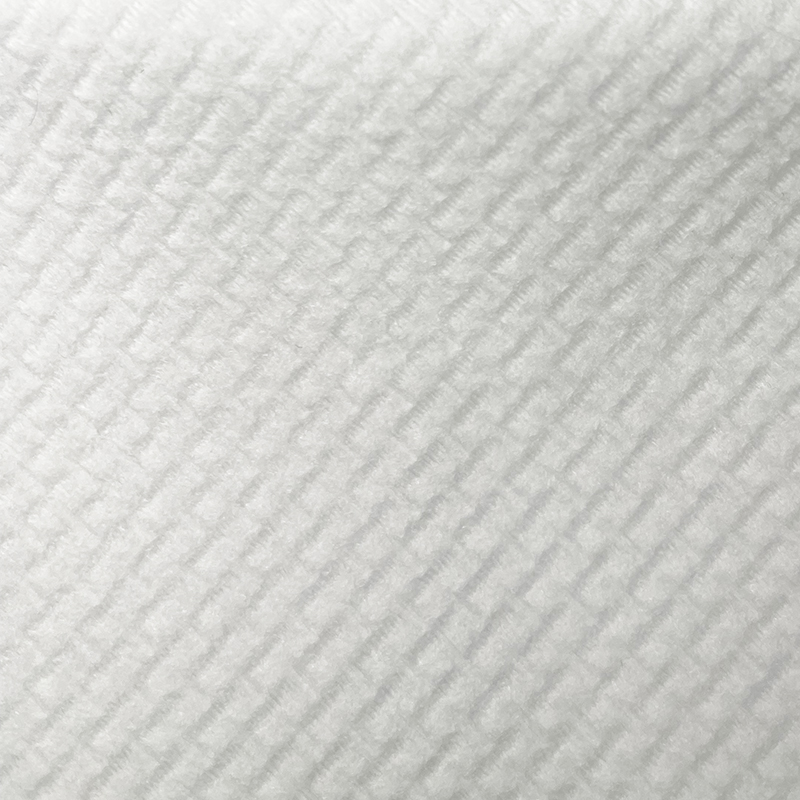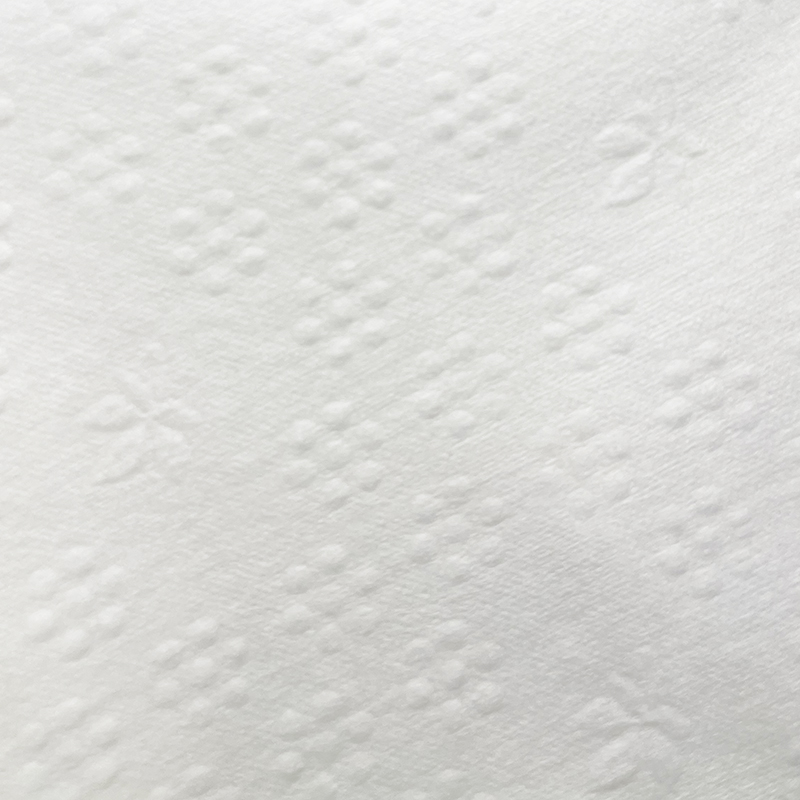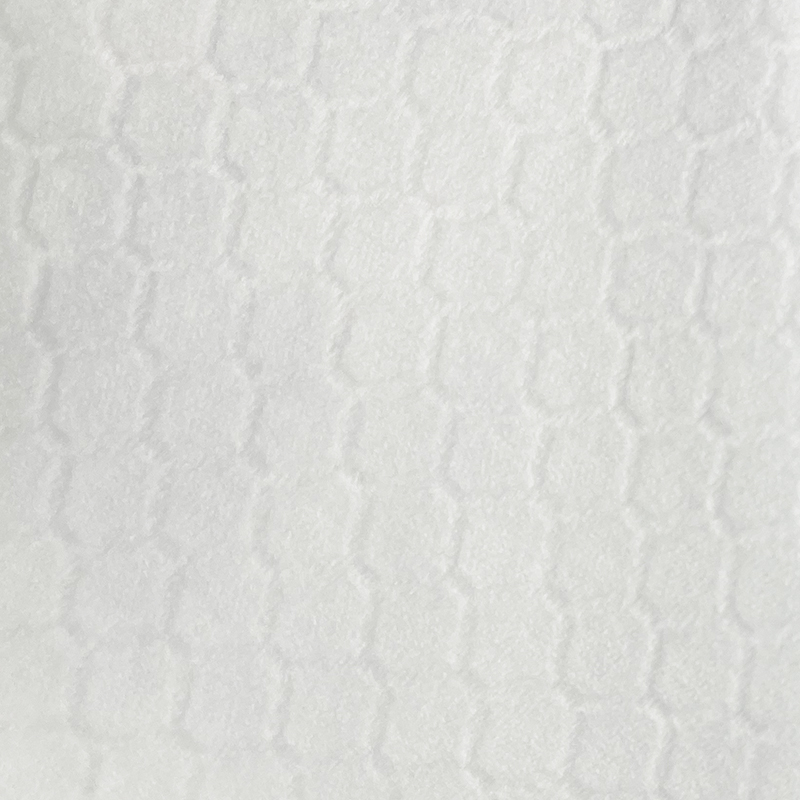Wet wipes, also known as moist towelettes, are disposable cloths used for cleaning purposes. They are commonly impregnated with a solution of water and other ingredients for cleansing and sanitizing. The raw materials used in wet wipes can vary depending on the intended use, brand specifications, and desired properties. Here's an overview of some common raw materials used in wet wipes production:
Non Woven
The non woven Fabric is the primary material used to make the wipe itself. Nonwoven fabrics are engineered materials made from fibers that are bonded together mechanically, thermally, or chemically. They can be made from synthetic fibers like polyester or polypropylene, natural fibers like cotton, bamboo, wooden fiber, or a blend of two. The choice of nonwoven fabric depends on factors like strength, softness, absorbency, and cost.
Different patterns
Nonwoven fabric used in wet wipes manufacturing can come in various patterns, each serving specific purposes and offering distinct benefits. The choice of pattern can depend on several factors, including the intended use of the wet wipes and the desired properties of the final product.
Different Composition
Nonwoven fabrics for wet wipes vary in fiber composition, including polyester for strength, viscose for softness and absorbency, custom blends for specific properties, bamboo for eco-friendliness and antibacterial qualities, and wooden fibers for softness and absorbency. Each type offers unique benefits, catering to different uses and consumer preferences.
Biodegradable material : The nonwoven fabrics that is made of natural plant, 100% viscose(cotton), 100% bamboo, 100% wooden fibers
Flushable material: Made of Wooden Fibers
Ingredients Of Wet Wipes
As an OEM and private label manufacturer of wet wipes, we specialize in a diverse range of products tailored to specific needs. Our extensive series includes baby wipes, personal care wipes, household cleaning wipes, pet wipes, medical wipes, and specialty cleaning wipes. Each category demands a unique formulation, and we take pride in our ability to develop custom formulas optimized for efficacy and safety.
With years of experience and expertise in the industry, we've honed our formulations to meet the highest standards of quality and performance. Whether it's gentle ingredients for baby wipes, powerful cleansers for household cleaning wipes, or specialized formulations for medical and specialty cleaning wipes, we ensure that every product delivers exceptional results.
Moreover, we understand that our clients may have their own specific requirements and preferences. That's why we offer the flexibility to accommodate custom formulas, tailoring our production to meet their exact specifications.
Partner with us for premium wet wipes that cater to a wide range of applications. Whether you're looking to expand your product line or create a brand-new offering, we're here to provide you with top-quality solutions that meet your needs and exceed your expectations.

Water
In the realm of wet wipes manufacturing, the quality of water utilized in the production process plays a crucial role in determining the final product's purity and effectiveness. Reverse Osmosis (RO) technology has long been employed to purify water for various industrial applications, and now, with the advent of Electrodeionization (EDI), the bar for water purity has been raised even higher. This article explores the integration of EDI pure water technology, specifically RO II, in wet wipes manufacturing processes, and its manifold benefits.

What is EDI Pure Water Technology?
Electrodeionization (EDI) is an advanced water purification technology that employs both ion exchange resins and electricity to remove impurities from water. Unlike traditional ion exchange methods, which require periodic regeneration with chemicals, EDI continuously produces high-purity water without the need for such regenerants. In conjunction with Reverse Osmosis (RO), EDI forms a potent combination known as RO II, which ensures the removal of virtually all dissolved solids and ions from water, resulting in water of exceptional purity.
rants. In conjunction with Reverse Osmosis (RO), EDI forms a potent combination known as RO II, which ensures the removal of virtually all dissolved solids and ions from water, resulting in water of exceptional purity.
Benefits of EDI Pure Water in Wet Wipes Manufacturing:
-
Enhanced Product Quality: The utilization of EDI pure water in wet wipes manufacturing guarantees a superior end product. Contaminants and impurities present in conventional water sources can adversely affect the texture, efficacy, and shelf life of wet wipes. With EDI pure water, we can maintain consistent quality standards, delivering wipes that are gentle on the skin and free from harmful residues.
-
Increased Efficiency: RO II systems not only purify water to exceptionally high standards but also do so with minimal energy consumption. This efficiency translates into cost savings for us, as less energy is required to operate the purification process. Additionally, EDI systems have low maintenance requirements, reducing downtime and optimizing production throughput.
-
Environmental Sustainability: EDI technology aligns with environmentally conscious manufacturing practices by minimizing the use of chemicals and reducing wastewater discharge. Unlike traditional water treatment methods that generate chemical waste during regeneration cycles, EDI operates without the need for such chemicals, resulting in a smaller environmental footprint.
-
Compliance with Regulatory Standards: The purity of water used in wet wipes manufacturing is subject to stringent regulatory standards imposed by health authorities and industry bodies. By implementing EDI pure water technology, we can ensure compliance with these standards, mitigating the risk of product recalls or regulatory penalties due to water quality issues.
-
Versatility and Adaptability: EDI systems can be customized to meet the specific requirements of different wet wipes manufacturing processes. Whether producing baby wipes, disinfectant wipes, or specialty wipes for industrial applications, RO II technology can be tailored to deliver water of the precise quality and quantity needed for each application, ensuring consistent product performance.
Packing Solution
At WetWipesPro, we believe in providing not only effective hygiene solutions but also in taking responsible steps towards environmental sustainability. Our commitment to reducing waste and minimizing our carbon footprint has led us to innovate in every aspect of our product, including packaging.
Our wet wipes packaging material is carefully selected to minimize environmental impact while maintaining the highest standards of hygiene and durability. We utilize biodegradable and compostable materials that break down naturally over time, reducing the burden on landfills and ecosystems.
Common raw materials for soft packing wet wipes include laminated packing film, plastic lids, lid labels, open stickers, and hot melt glue.












